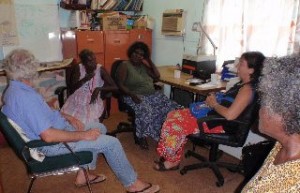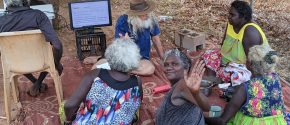Response to the federal Government’s Our Land Our Languages inquiry into Indigenous languages.

Why Warriors has always advocated that working with Yolŋu people in their own languages is the most efficient way for Yolŋu people to receive effective education, training and information towards their own empowerment. For this reason we require all our resource workers to learn to speak Yolngu Matha.
This might seem like a no-brainer to many people, but almost all of the education, training and information delivered to Yolŋu people today is in English. English is still a very foreign language for Yolŋu people and many other Aboriginal people, requiring them to do the hard communication work all the time.
Richard Trudgen
To read the submissions made to the inquiry, see http://www.aph.gov.au/Parliamentary_Business/Committees/House_of_Representatives_Committees?url=atsia/languages/submissions.htm
See no.37 for the submission from Why Warriors and the AHED Project and no.84 for the submission from Richard Trudgen.


